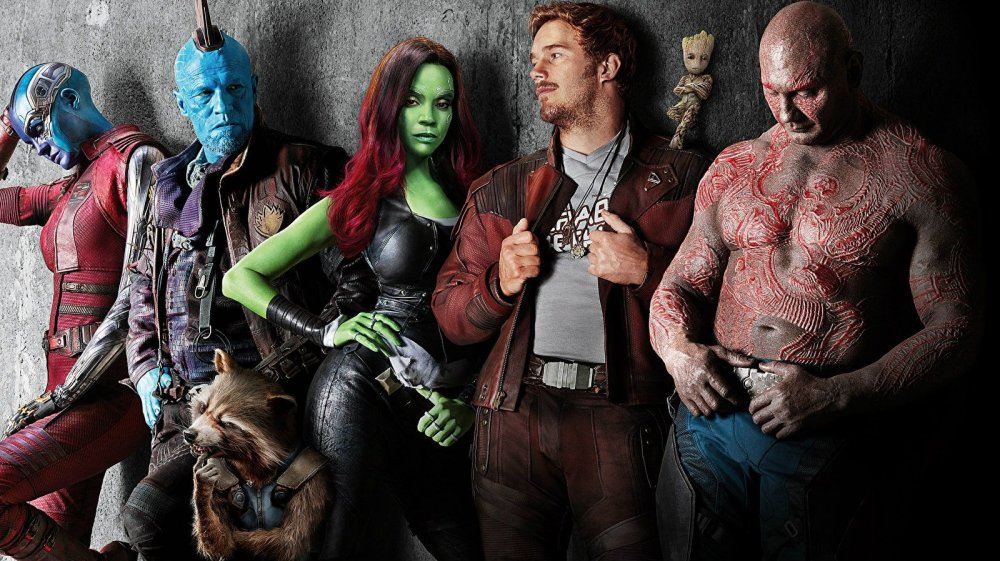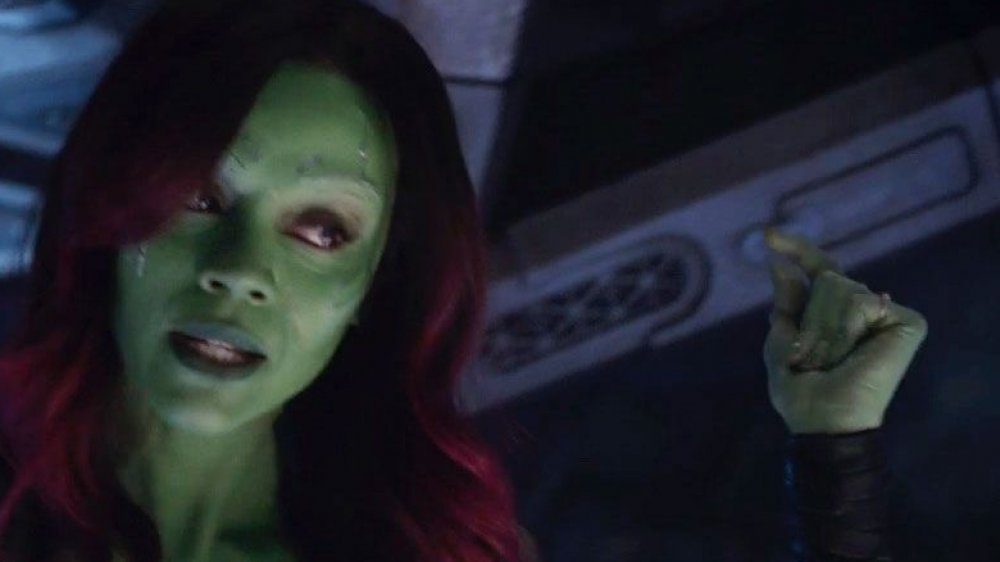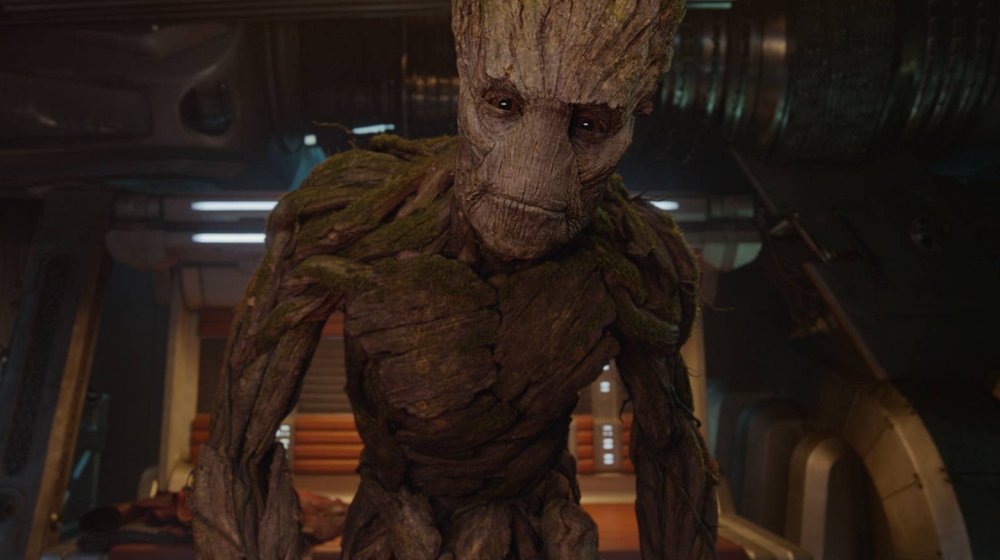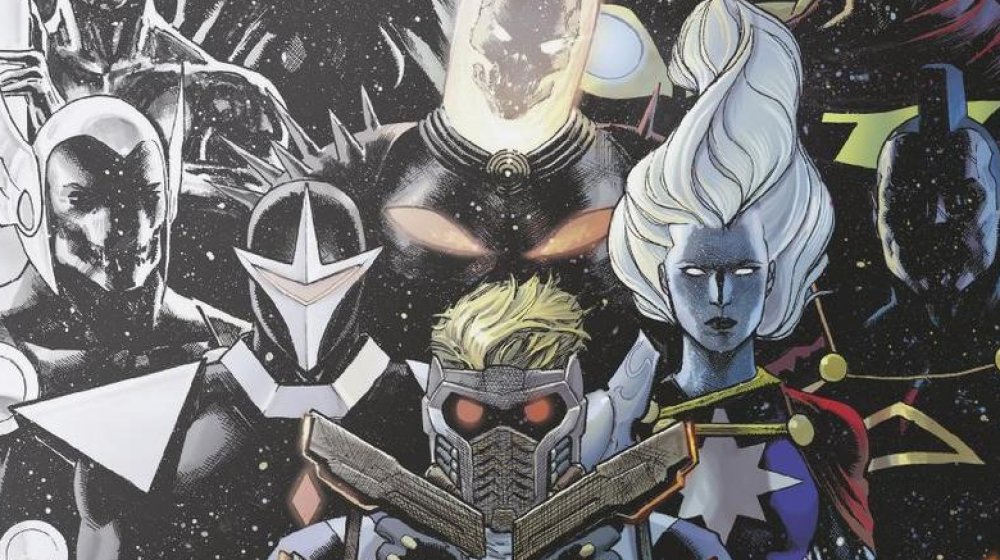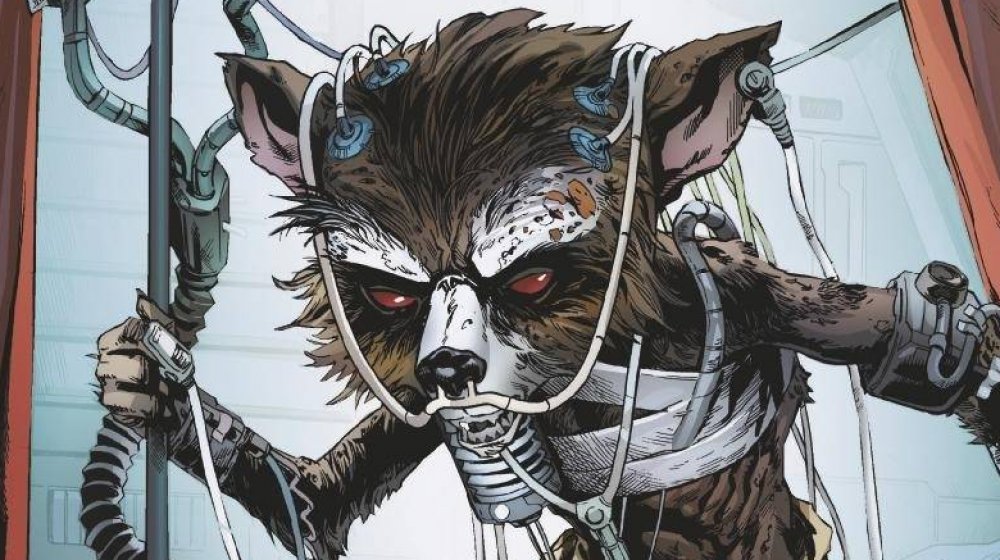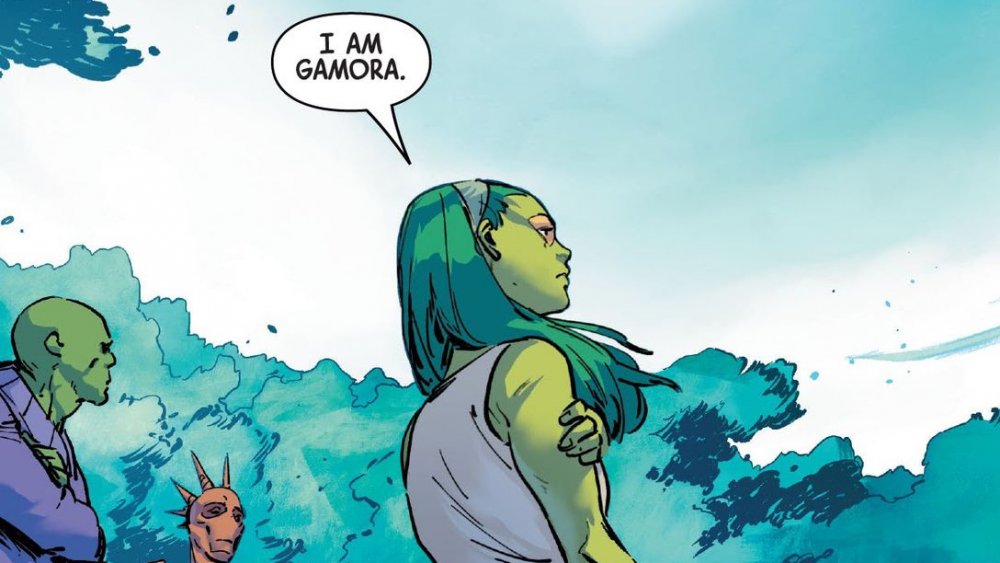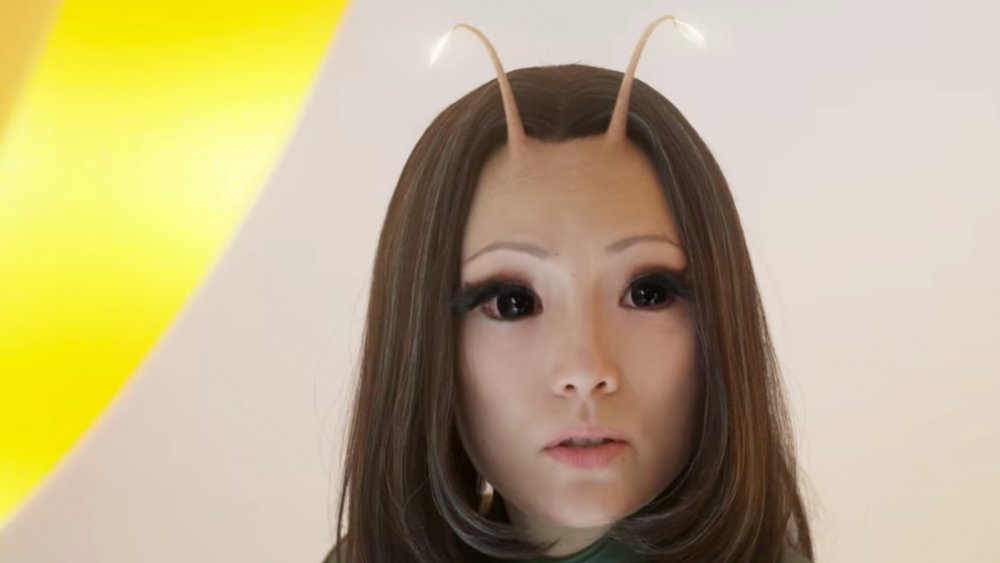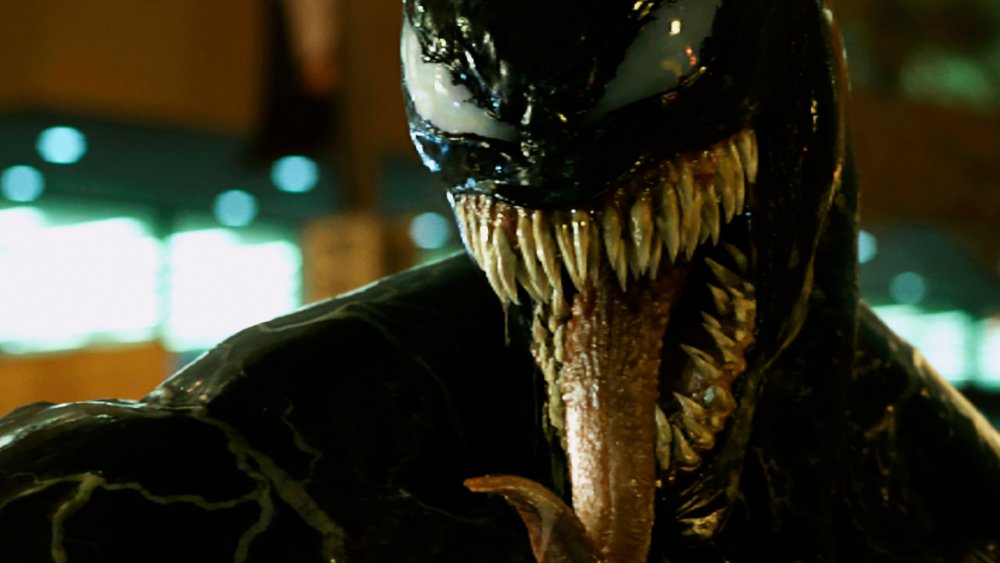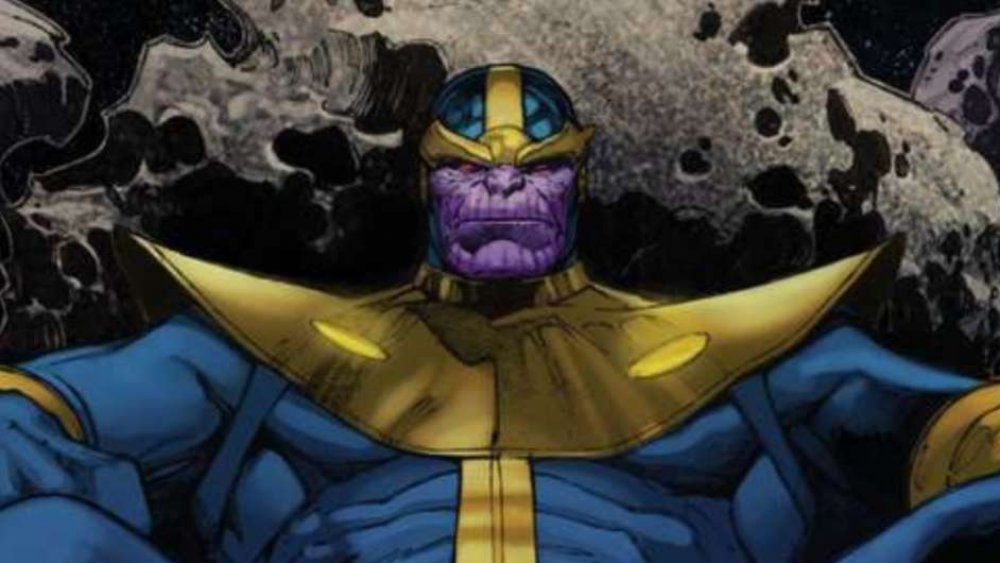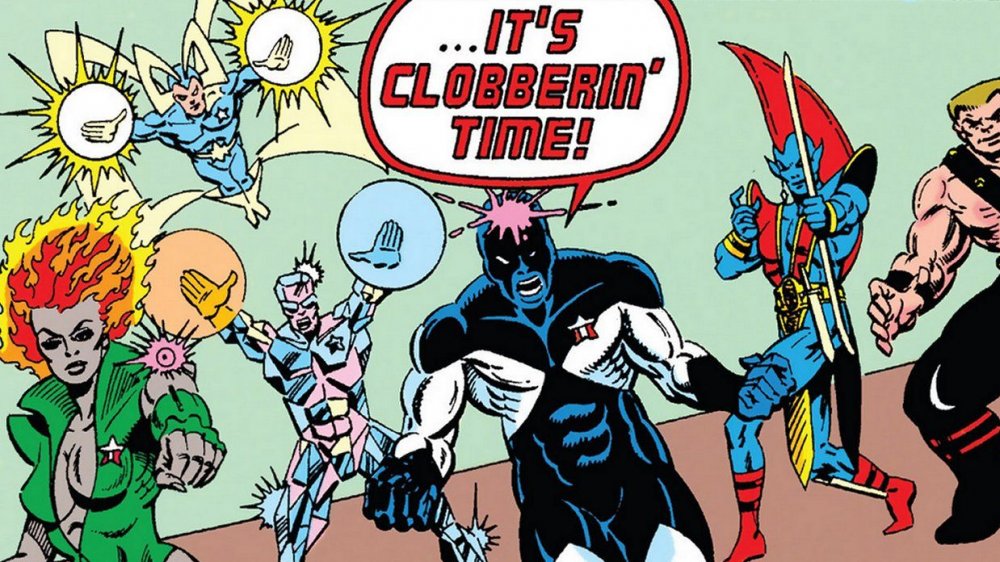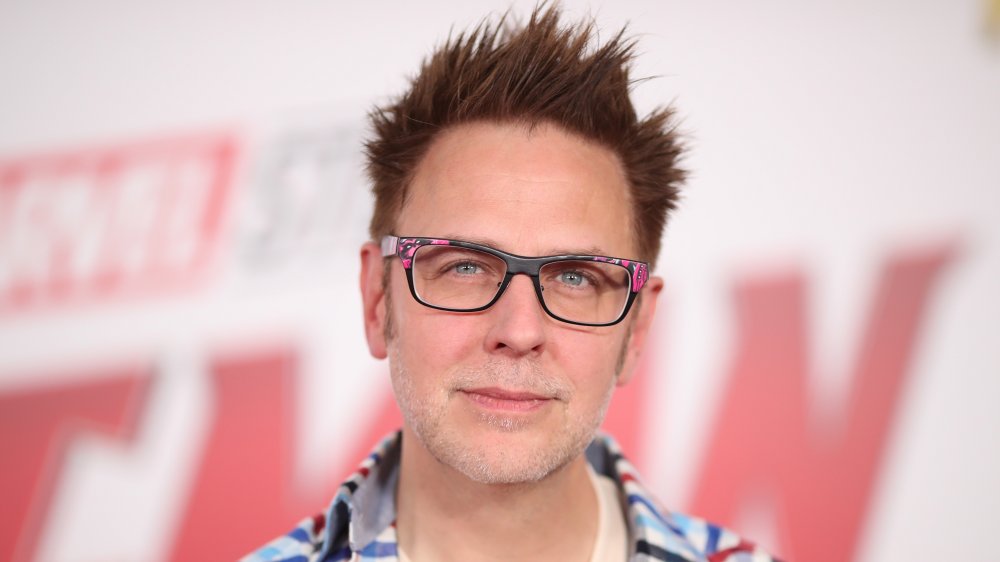Marvel Lied To You About Guardians Of The Galaxy
In theory, the entire Marvel Cinematic Universe shouldn't have panned out.
It's easy to forget that back in 2008, the idea of a big-budget superhero movie in which the titular character wasn't a household name hardly inspired expectations of box office dominance. But anyone who acted as if they knew for certain that Iron Man wouldn't "work" wound up looking like a big ol' chump. Furthermore, the success of Robert Downey Jr.'s Tony Stark preemptively silenced anybody who might've otherwise suggested movies about Norse gods or time-traveling World War II super soldiers sounded stupid and unprofitable.
But even after The Avengers cemented the MCU as a cultural behemoth, some of us weren't so sure mainstream audiences would accept a talking raccoon. In theory, Howard the Duck proved that talking animals in Marvel superhero movies, or Marvel superhero-adjacent movies, do not work, and are bad; in practice, Guardians of the Galaxy was very much accepted by mainstream audiences. It racked up critical praise, made more than a cool $772 million, and not unlike Iron Man, launched previously obscure Marvel characters into mainstream ubiquity.
That doesn't mean Marvel hasn't ever misled fans about the Guardians of the Galaxy. In many ways, Marvel is always doing that. The Guardians are imaginary. By definition, everything about them is a lie. But let's take a closer look at a few times when Marvel really made the Guardians' audience heads spin with confusing information.
Who slaughtered the Zehoberei? Marvel has no idea
Gamora — the last member of the Zehoberei species, originally from the planet Zen-Whoberi — has had her backstory in the comics altered and shifted enough times to throw any casual observer of Guardians history for a loop. This hardly makes her unusual amongst her superhero colleagues. Carol Danvers didn't used to be part Kree, but now she is. For a little while, Steve Rogers was a longtime sleeper agent for H.Y.D.R.A. Wonder Woman's origin story has been rebooted so many times that she spends the first few issues of her 2016 series hashing out what did and didn't happen during her early years. You get the idea.
It appears the shot-callers at Marvel Comics made a wise decision sometime in the vicinity of 2019. In a six-issue Thanos miniseries written by Tini Howard and drawn by Ariel Olivetti, Gamora tells the reader that Thanos and his squad of homicidal sidekicks invaded her home planet and massacred every resident Zehobereian apart from herself. This version of Gamora's story syncs up with the MCU, wherein Thanos destroys half of Gamora's species.
But in a previous comics version of the same story, the Magus's Universal Church of Truth kill all the Zehoberie. And in an even older iteration of Garmora's traumatic childhood, her kinspeople are wiped out by a lesser-known horde of murderous space creatures known as the Badoon.
Apparently, Gamora's parents, plus all her other relatives and friends, were murdered by whichever perpetrator happens to best serve whatever story she's appearing in at the present moment. In this way, she's not unlike Batman. Remember, because their lone source of Batman-related knowledge came from the first Tim Burton movie, an entire generation of moviegoers once believed the Joker killed Thomas and Martha Wayne. What sad fools they were.
Groot is dead. Long live Groot
Beloved tree monster Groot seemingly sacrifices himself to protect the rest of the team in the first Guardians movie from 2014. But at the very end of the film, a dancing twig with a face appears in a pot. Surely, the emergence of this Baby Groot means Groot has been reborn from the remnants of his own smoldering carcass, right?
Well, that's what we all thought for a while. But now we know better. As a result, our capacity to experience joy has been permanently diminished.
"Groot is dead," wrote director James Gunn in a 2017 Facebook post, even sounding slightly flummoxed by the fact that so many viewers assumed Groot and Baby Groot are the same individual. He added, "Although I don't necessarily think it's obvious in Vol. 1, it's important to say that if you exploded and a little glob you started growing into a baby, I would not assume that baby was you."
While some Groot superfans — like those appear at the bottom of this Mashable article – continue doing mental gymnastics to convince themselves to the contrary, it appears those of us who assumed the original Groot still lived have been living an absurd, tragic lie.
The cover of Guardians #1 (Vol. 5) makes the team look much bigger and cooler than it is
Here we have a lie that looks so beyond cool that when we discover that it's a significant exaggeration, it's hard to be all that upset.
At the onset of the Guardians comics relaunch of 2019, the team consists of Star-Lord, Groot, Moondragon, Cosmic Ghost Rider, Beta Ray Bill, and Phyla-Vell. However, the primary cover features silhouettes of the aforementioned, plus Nova, Silver Surfer, a person that looks an awful lot like Adam Warlock, and Gladiator of the Shi'ar Imperial Guard. A wraparound variant drawn by Geoff Shaw makes the team look even more impressive. It's an entire crowd of cosmic Marvel favorites like Howard the Duck, Galactus, Super-Skull, the Starjammers, and Cosmo the Spacedog.
Except for Galactus, who simply doesn't show up in this series at all, all of the characters on the wraparound cover appear in that particular floppy comic book issue. The problem is most of them don't join the team. A lot of them just pop up in a panel and never say or do anything.
Donny Cates' entire Guardians run kicks considerable booty, and a righteously awesome cover looks righteously awesome. It is what it is. But when we're told Galactus is gonna show up, then it's always nice to see Galactus actually show up, y'know? The real Galactus would never leave us hanging like that.
In a story pitched as "The Death of Rocket," Rocket does not die
By now, everybody knows that death is more-or-less a provisional condition for characters in superhero comics. But the marketing for a relatively recent arc took the superhero stunt death cliché to a whole new level. Previews for the seventh issue of Donny Cates' Guardians run, drawn by Corey Smith, depicted a bloody brown paw sliding down a glass surface. Below, the caption read "The Death Of Rocket!"
We've probably already spoiled too much for anyone who hasn't already read that series, so we won't go into further details. But let's just say there was no need for Cates or Al Ewing or any recent Guardians writer to figure out an explanation for Rocket's obligatory resurrection, because Rocket Racoon does not die at any point during that story arc. This isn't a situation where a comics character dies and comes back under dubious circumstances. Rocket doesn't even fake die in this story, even though he was explicitly advertised to do so. In fact, as of this writing, Rocket Racoon remains alive and well, quipping and shooting things and being a foul-mouthed rascal.
So while this outcome is preferable to that which was advertised, Marvel nevertheless pulled the switcheroo on fans here.
Groot isn't just saying "I am Groot" all the time to be cute. That's also all he hears.
If you're like most people, you're primarily familiar with Groot as he and Baby Groot appear in MCU movies. The only thing Groot ever says is "I Am Groot," and the other characters have to interpret what he means through emotional cues and syllabic emphasis. It's all quite hilarious. It's also not the whole story.
If you're a member of the segment of humanity that reads comic books, you may know that Groot regained his ability to speak normally at the onset of the Infinity Countdown event back in 2018. But that doesn't mean he hears like a normal humanoid space being.
Let's take a gander at the opening pages of the third issue of Al Ewing's tenure with the Guardians gang, which hit the shelves in 2020 and took the franchise in a more cerebral direction than his predecessor. (Let's say Donny Cates is a little more Star Wars-y in his approach, whereas Ewing's writing is a little more Star Trek-ish.) We can't provide context without spoiling the story for any uninitiated readers who stumbled upon this article, but what's important is Ewing shows us that from Groot's point of view, the other characters only say "I am (my name)" and he has to interpret what they mean through emotional cues and syllabic emphasis. He only ever hears Gamora say "I am Gamora." From Groot's perspective, Drax only says "I am Drax." And so on. It's all quite inconvenient, but at least Groot appears accustomed to and comfortable with the circumstances. Groot's language does not operate exactly how Marvel led us to assume, it seems.
Mantis does not appear in these movies, according to the creator of Mantis
Anyone who's ever read literally any X-Men comic and also watched literally any of the X-Men movies can tell you cinematic versions of characters don't always match their original ink and pulp iterations. And while nobody seems to mind the version of Mantis who first appears in Guardians Vol. 2, she's a considerable departure from the Mantis who originally showed up in 1970s Avengers comics. In fact, the writer who birthed Mantis from his idea womb barely recognizes her these days.
"That character has nothing to do with Mantis," creator Steve Englehart told Polygon in a 2017 interview. Back in the kooky crazy days of the 1970s, Englehart also created Star-Lord, Shang-Chi, and Hellcat. He says he likes the film overall and thinks Pom Klementieff does a perfectly stellar job, although her job isn't really pretending to be Mantis.
"They're doing good stuff and I enjoyed my night at the movies so long as I turned my brain off to the fact that that's not Mantis up there," he added. "I really don't know why you would take a character who is as distinctive as Mantis is and do a completely different character and still call her Mantis. That I do not know."
You'll note Englehart implies the character Klementieff plays should've been named something else. He doesn't necessarily make a case that the Mantis he envisioned should be in the film instead.
Maybe — and this is just speculation — that's because the original comic book Mantis is a human Vietnamese woman who's a martial arts master and former sex worker. Not everything that works in comics from the 1970s makes any sense at all in modern, ostensibly kid-friendly superhero movies.
Guardians movies must cross over with Venom, or they have failed
Another thing you might not realize about the Guardians of the Galaxy if you're not a comics person is the fact that a handful of unlikely but very famous superfolks have gone through the squad's revolving door of membership in recent years. The Thing, typically associated with the Fantastic Four, was a Guardian of the Galaxy for a bit. So was X-Men stalwart Kitty Pryde. But we don't know what the MCU version of either of those characters might look like, thus we don't know if they'd be a good fit for the MCU iteration of the Guardians.
Meanwhile, Venom was a Guardian in the comics for a while. And we know exactly what the cinematic Venom looks like: a human/alien hybrid monster who absolutely belongs with the cinematic Guardians, boy howdy.
The 2018 Venom movie — with Tom Hardy as Eddie Brock, the host for the titular alien symbiote — didn't impress everyone who saw it. But the interactions between Brock and Venom are raw comedic gold, and require a film with a director who appreciates their potential. That director is James Gunn, and that movie is somewhere in the Guardians franchise.
Of course, the rights to Spider-Man-adjacent characters all remain with Sony Pictures, who don't always have the chummiest relationship with Marvel. So odds are, someday, Marvel will tell us they're all done making Guardians movies for the time being, and the franchise is complete, even though Rocket Raccoon never met Venom during any of his numerous space adventures. On that day, Marvel will be lying liars telling us lies.
Thanos' big plan is an absurd load of bunk
Between Kurt Russell's Ego from Guardians Vol. 2, Michael B. Jordan's Killmonger in Black Panther, and Michael Keaton's Vulture in Spider-Man: Homecoming, Marvel resolved the "villain problem" that hampered the early MCU well before Thanos made his presence felt in Infinity War. Not unlike the aforementioned ne'er-do-wells, Thanos thinks of himself as a guy with good intentions. He needed the Infinity Stones to cut the universe's entire population of living things in half, so planets wouldn't run out of resources and crumble into despair and starvation, as had been the case for his home planet of Titan. How sweet of Thanos to go to all that trouble just to help the rest of the universe, eh? What a guy!
Most of us can remember someone we know, or maybe just someone who posted something we read on Twitter, saying something like "Thanos is the secret hero of this film." But if you think about it, that person who said Thanos is the secret hero is an idiot, and by failing to present Thanos as a moron, Marvel kinda lied to us.
Thanos' plan falls apart on a few different levels. The Smithsonian points out that philosopher Thomas Malthus voiced basically the same concerns about overpopulation on Earth during the 1700s. Humans invented a whole bunch of new technology afterward, and Malthus wound up looking like an alarmist. Scientists also speculate that erasing half the insect population of planet Earth could cause massive ecological collapse, or possibly lead to rats evolving to become the planet's dominant species. Not cool!
In addition, Forbes writer Paul Tassi makes the case that if Thanos' intentions are genuinely altruistic and he isn't merely a genocidal maniac in denial, couldn't he simply use his omnipotent Infinity Gauntlet power to create self-sustaining food and water sources? Or cure all diseases? Or solve climate change? Or why can't he take one of the options on the literal laundry list of things he could do that would also prevent other planets from being ruined without killing anybody?
The comic book version of Thanos doesn't bother trying to convince anyone his intentions are even slightly noble. He only wants to annihilate life on massive scales because he's trying to impress Death, who for some reason is often depicted as a sexy lady in comic books. This means the comic book version of Thanos is both a bigger psycho — and better at logical thinking — than his onscreen counterpart.
The original Guardians are nothing like the modern-day Guardians
Obviously, a lot can happen in 50 years, especially to comic book properties that have to crank out seemingly fresh and innovative concepts for stories every month. Since the first appearance of a team called "The Guardians of the Galaxy" in 1969, the entire DC Universe has been rebooted on multiple occasions. Cross-media Batman started out as a Bright Knight played by Adam West, became grimdark and spooky under the direction of Tim Burton, went back to camp when Joel Schumacher took over, and resumed a gritty and brutal persona when Christopher Nolan inherited the wheel of the metaphorical batmobile. Superhero stuff changes a lot.
But the fact remains that the Guardians we know don't have a ton in common with the team that premiered in the late '60s. Back then, the crew was Vance Astro, Martinex T'Naga, Captain Charlie-27, and a character who's apparently been retconned into a far-off descendent of Yondu. They existed in a distant future and blipped in and out of visibility for a few decades until another new Guardians team arrived in the early 1990s. The '90s Guardians also bore little resemblance to the Guardians of the current millennium.
All of the "Guardians" teams are superheroes who operate in outer space, so maybe this isn't a case of a complete and total bait and switch. But saying the original Guardians and the current Guardians are continuations of the same idea is kind of like saying the Defenders as penned by Steve Gerber are more or less similar to Netflix's team of Defenders. It's kinda true, but also a pretty significant stretch.
They told us James Gunn wouldn't direct the third Guardians movie
If a statement is true at the time it is said, and becomes inaccurate later, does that mean it was always a lie? For the purposes of ending this list, why not?
When far right-wing political zealots on the internet took issue with James Gunn's intense dislike for President Donald Trump, they retaliated by making Disney aware of offensive tweets Gunn had written years earlier. The tweets — which had been addressed in other outlets before the release of the first Guardians film, and some people considered public knowledge at the time — were apparently news to Disney, who fired Gunn from his scheduled Marvel projects in 2018.
Whether or not the executives involved were overly concerned about potentially repeating a recent scandal related to offensive tweets by Roseanne Barr, another highly paid Disney employee, is a matter of pure speculation. Either way, after significant public outcry, Gunn was brought back into the Marvel fold a year later.
And as a silver lining, Warner Bros. hired Gunn to cook up a new Suicide Squad movie during his year away from Disney, meaning that the short-lived scandal led to fans getting the third Guardians movie, plus a Suicide Squad film that's likely to contain some of the same madcap spirit. Apparently, every once in a while, choices made by giant corporations work out superbly for everyone.
